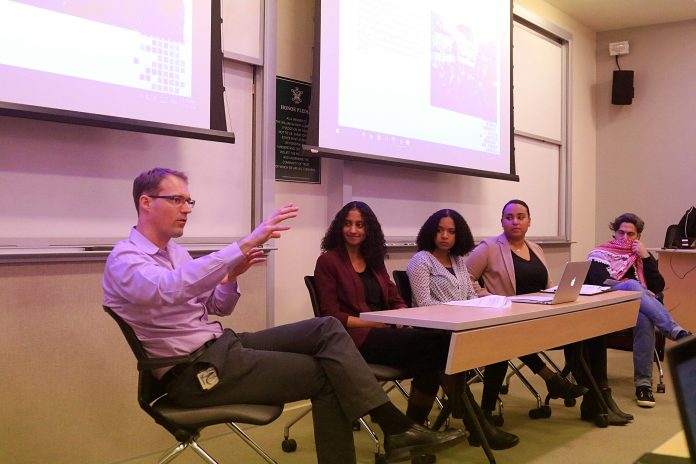A trio of Sudanese-American students at the College of William and Mary organized a joint lecture and panel discussion Friday, Feb. 15, to discuss Sudan’s ongoing political protests. The event, titled “Sudanese Protest: Teach-In,” was intended to educate the College’s undergraduate population about the protests against Sudanese President Omar al-Bashir’s authoritarian regime. Rioting has occurred throughout Sudan since December 2018 and has materialized in approximately 30 cities in the past two months.
The teach-in was divided into three segments. First, Amna Baloul ’20 gave a brief overview of Al-Bashir’s rise to power in the 1980s. According to Baloul, al-Bashir attended a military college and rapidly rose through the ranks of the Sudanese military before finally reaching the position of Colonel. In 1989, al-Bashir spearheaded a military coup against Sudan’s then-Prime Minister Sadiq al-Mahdi. Al-Bashir quickly established control over the country’s political machine, and swiftly implemented his interpretations of Shari’a law into Sudanese civic society.
In doing so, Baloul noted that al-Bashir dissolved parliament and severely limited press freedom and civil liberties. Furthermore, al-Bashir’s explicit incorporation of Shari’a law into the state’s political affairs alienated significant portions of the predominantly Christian southern regions of Sudan and eventually contributed to the Second Sudanese Civil War, as well as the ultimate secession of South Sudan in 2011.
After Baloul provided context for al-Bashir’s rise, Shadin Ahmed ’19 provided a synopsis of Sudan’s political history. In 1996, al-Bashir was re-elected to the presidency with 75 percent of the vote. He was subsequently re-elected in 2000, 2010 and 2015 with 86 percent, 68 percent and 94 percent of the vote, respectively, despite his previous statements that he would step down prior to the 2015 presidential election.
Ahmed explained that the political environment in Sudan has been marred by controversy for the past decade, following the International Criminal Court’s 2008 filing of charges against al-Bashir for crimes against humanity in Darfur. In 2009, the ICC issued an arrest warrant for al-Bashir, but he still remains in power 10 years later. The global nature of these indictments has partially contributed to the outbreak of protests throughout the international community, as well as within Sudan.
“There’s been protests in Washington, D.C., in Indonesia, in London and in Canada, and in so many countries around the world,” Ahmed said. “… This has really become a worldwide effort.”
“There’s been protests in Washington, D.C., in Indonesia, in London and in Canada, and in so many countries around the world,” Ahmed said. “… This has really become a worldwide effort.”
Saja Ibrahim ’21, the panel’s third student speaker, subsequently related Sudanese history to the country’s current riots. The disputes were popularly dubbed “bread protests” by major Western media outlets as the outbreak of protests initially appeared to be the consequence of increased bread prices and sharp rises in inflation, which according to Ibrahim, has quadrupled in the past decade.
Ibrahim provided a personal anecdote from her visit to the country in summer 2018, when she spent two weeks in the Sudanese capital of Khartoum. When she arrived in Khartoum, she approximated that the exchange rate between the Sudanese and Americans currencies was approximately 40:1. When she left, the value of the Sudanese pound had deteriorated to the point that 55 Sudanese pounds equaled $1, despite incomes remaining stagnant.
Ibrahim said that the riots are a culmination of several years of political discontent and economic decline rather than an immediate response to rising prices in food. Ibrahim said that attempting to blame the protests on a singular cause is unproductive, and that it fails to take into account the various past protests that have materialized in the country under al-Bashir’s rule. Protests have occurred in Sudan several times under al-Bashir’s regime, and this most recent iteration is not a new phenomenon.
“This hasn’t been the first time that people in Sudan have protested and gathered,” Ibrahim said. “There have been multiple attempts in the past to overthrow the government regime, but each one has been met with even harsher suppressions.
“This hasn’t been the first time that people in Sudan have protested and gathered,” Ibrahim said. “There have been multiple attempts in the past to overthrow the government regime, but each one has been met with even harsher suppressions. Just to name a few, the government executed over 28 officials in a failed coup in 1990 … in September of 2013, over 200 youths were killed in demonstrations that took place.”
Following the teach-in, Baloul, Ahmed and Ibrahim were joined by Philip Roessler, an associate professor in the College’s government department, and professor of Arabic studies Stephen Sheehi. The three students and two faculty members answered questions from the audience and delved deeper into topics such as Sudan’s geopolitical standing, the country’s economic history and the role of young people in the current protests.
In describing what is different about the 2018-19 protests, Sheehi underlined the fact that while social media has played an important role in mobilizing these public demonstrations, they stem from years of concentrated planning and should not be interpreted as spontaneous or unexpected occurrences.
“The protests don’t come out of the blue,” Sheehi said. “They never come from the dormant political, civil society … [like with] the Arab Spring, everyone was like, ‘Oh, where did [the protests] come from? It’s because everyone got woke with Twitter!’ It’s like, no, people have been doing work for a long time.”
“The protests don’t come out of the blue,” Sheehi said. “They never come from the dormant political, civil society … [like with] the Arab Spring, everyone was like, ‘Oh, where did [the protests] come from? It’s because everyone got woke with Twitter!’ It’s like, no, people have been doing work for a long time.”

